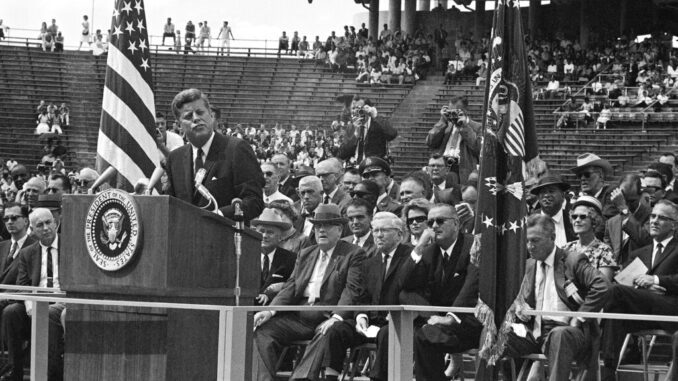
President John F. Kennedy delivered his “Moon Speech” at Rice University on September 12, 1962.
In a brief 18-minute speech, he encapsulated what separates Americans from every other nation and culture on earth in words which should inspire us to do great things today.
“We choose to go to the moon in this decade and do the other things not because they are easy, but because they are hard.”
JFK used his talents ― and those of his speechwriter and muse, Ted Sorensen ― in rhetoric, charisma and leadership ability to inspire all Americans to join together in one of the greatest endeavors in human history ― landing an American astronaut on the moon within the next seven years.
“We meet in an hour of change and challenge, in a decade of hope and fear, in an age of both knowledge and ignorance…Condense, if you will, the 50,000 years of man’s recorded history in a time span of about a half a century. Stated in these terms, we know very little about the first 40 years, except at the end of them, advanced man had learned to use the skins of animals and cover them.
About 10 years ago, under this standard, man emerged from his caves to construct other kinds of shelter. Only five years ago, man learned to write and use a cart with wheels. Christianity began less than two years ago. The printing press came this year. And then less than two months ago, during this whole 50-year span of human history, the steam engine provided a new source of power. Newton explored the meaning of gravity. Last month, electric lights and telephones and automobiles and airplanes became available. Only last week, we developed penicillin and television and nuclear power.
This is a breathtaking pace and such a pace cannot help but create new ails as it dispels old…
We shall send to the moon 240,000 miles away, a giant rocket, more than 300-feet tall on an untried mission to an unknown celestial body, and then return it safely to Earth.
But why some say the moon? Why choose this as our goal? They may well ask, why climb the highest mountain? Why 35 years ago fly the Atlantic?
We choose to go to the moon in this decade and do the other things not because they are easy, but because they are hard. Because that goal will serve to organize and measure the best of our energies and skills, because that challenge is one that we’re willing to accept. One we are unwilling to postpone.
And therefore, as we set sail, we ask God’s blessing on the most hazardous and dangerous and greatest adventure that man has ever gone.”
Americans have always “done the hard thing.” It was a “hard thing” to win independence from King George III an establish the world’s first true self-governing democratic republic. It was a hard thing to keep the Union together through the Civil War while ending slavery. It was a hard thing to help Europe defeat the Kaiser in World War I and Hitler’s Nazi Germany and the Japanese Empire in World War II.
When other nations ran from adversity, Americans ran to them. Our fathers and grandparents ran to them to advance freedom and democracy worldwide after World War II. Americans faced off against the threat of communist Soviet Union in a Cold War for fifty years before they crumbled into the dustbin of history, not us. Americans have raced to free nations, not enslave them.
These were all herculean tasks accomplished by our parents, grandparents and forebears under great hardship for everyone, not only the soldiers whom we remembered this past Memorial Day. As American generations go, aging Baby Boomers have had a relatively easy time of it compared to them.
We Boomers owe future Americans some form of generational heroism before we shuffle off these mortal coils, don’t we? How about returning public education to world-class status? How about stopping the spread of socialism and protecting and defending free speech everywhere in every circumstance? How about doing the hard things we have been unable to solve for lo these many years?

